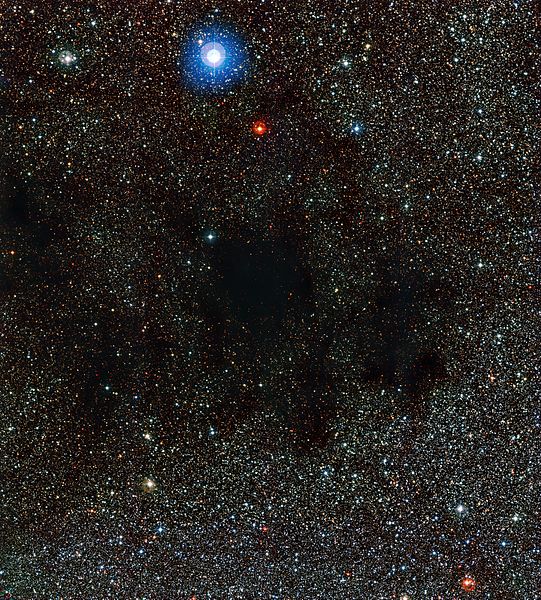Stygian Nebula
ω
What makes the nebula so dark
called Coalsack in the Milky Way,
a vision tenebrously stark
where murkiness is holding sway?
Is it a smudge on heavens’ face
within the constellation Crux?
an inky blot in outer space
or fissure in the cosmic flux?
Like black of raven’s ‘nevermore’
which haunted Poe’s poetic dreams,
stargazers penned this in their lore
for many centuries it seems.
Polynesians, Europeans,
Aboriginals saw it too,
making legends through the eons
of that eerie ebony view.
But let’s return to our query—
why this huge caliginous spot,
which reminds of ‘midnight dreary’?
Dust spread densely has formed the blot
with particles inside the cloud
that serve to block the starry glow,
along with gases to enshroud,
thus concealing the astral show.
The scanty gleam which does get through
appears to have a crimson hint,
since dust absorbs the starlight blue
plus strews it more than with red tint.
Descriptions in science fiction
deem the region a deadly sphere
or give picaresque depiction
to conjure up abysmal fear.
My plunge in imagination
sees a zone devoid of borders
with creatures lacking salvation
from their sensory disorders—
a world of shadow entities
whose basest wants rule every deed,
having perverse identities
that feed on ignorance and greed.
They are accustomed to the night,
for even with the break of morn
the blackness lingers like a blight,
its luminosity unborn.
Delusion shapes their self-made hell
from karmic causes gone awry
in kingdom where these beings dwell
that’s stygian against the sky.
Conspicuous as silhouette,
this realm cimmerian is quite
a melancholy sight, and yet,
behind the darkness hides the light.
Plus someday that domain of dust
might suddenly turn stellar bright.
Through gravity it could combust,
ending the Coalsack’s sooty plight,
as coalescence brings about
a radiant nebula shine
while future stars from fuel sprout
in universe’s redesign.
And like this massive cloud, as well
perhaps with humans it is so
that if they waken from their spell
enlightenment’s true seeds will grow…
~ Harley White
* * * * * * * * * *
Inspiration derived from article and image ~ A Cosmic Sackful of Black Coal
Inky Coalsack Nebula Smudges Milky Way in Striking New Views…
Coalsack Nebula...
Zooming into the Coalsack Nebula...
Zooming in on the dark and dusty Coalsack Nebula ~ video...
Reference to “The Raven” ~ by Edgar Allan Poe...
Further inspiration derived from the teachings and writings of Nichiren Daishōnin…
Nam Myōhō Renge Kyō means to devote our lives to and found them on (Nam[u]) the Utterness of the Dharma (Myōhō) [entirety of existence, enlightenment and unenlightenment] permeated by the underlying white lotus flower-like mechanism of the interdependence of cause, concomitancy and effect (Renge) in its whereabouts of the ten [psychological] realms of dharmas [which is every possible psychological wavelength] (Kyō).
The reason that we continually recite Nam Myōhō Renge Kyō
Image info ~ Part of the Coalsack Nebula ~ This image from the Wide Field Imager on the MPG/ESO 2.2-metre telescope shows part of the huge cloud of dust and gas known as the Coalsack Nebula. The dust in this nebula absorbs and scatters the light from background stars. Dark smudges almost block out a rich star field in this new image captured by the Wide Field Imager camera, installed on the MPG/ESO 2.2-metre telescope at ESO’s La Silla Observatory in Chile. The inky areas are small parts of the dark nebula, one of the most prominent objects of its kind visible to the unaided eye. Millions of years from now, chunks of the Coalsack will ignite, rather like its fossil fuel namesake, with the glow of many young stars.

Credit: ESO
| Table of Contents |
|